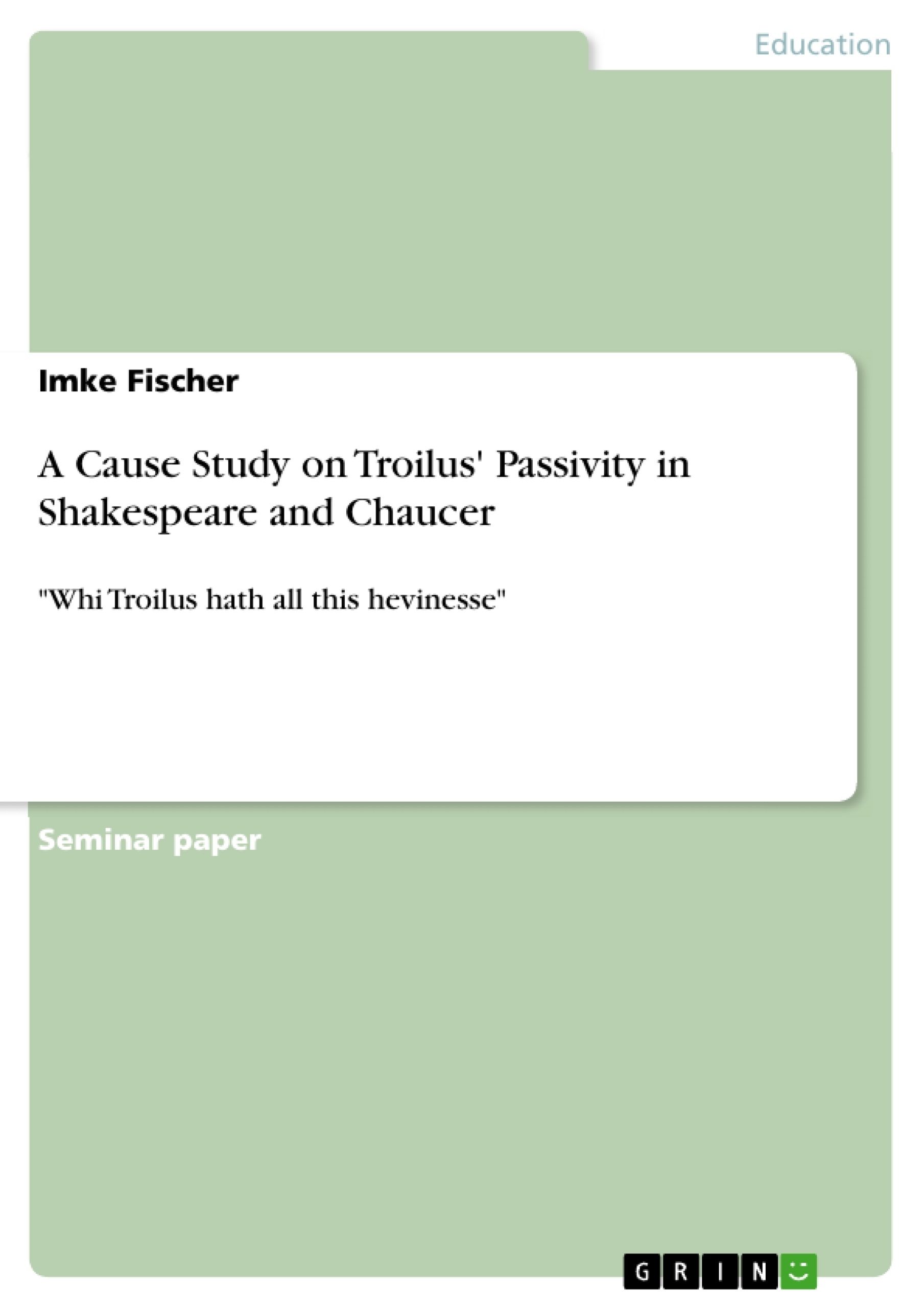The story of Troilus, his love of Cressida and her betrayal of this love against the backdrop of the Trojan War is a European story, manifold told by many authors through the centuries. Troilus himself is a character from ancient times, first mentioned shortly in the Iliad, before Ovid picks up the theme in his Metamorphoses. The first version of the story as it is known today appears in the middle of the 12th century in Benoît de Sainte-Maure‘s "Roman de Troie". Giovanni Boccaccio‘s rewriting of the story in his "Il Filostrato" around 1340 increased its fame and had ‘the father of English literature‘ Geoffrey Chaucer base his epic poem "Troilus and Criseyde" (1380s) thereon.
Nowadays, we find ourselves thus confronted with a conglomerate of different aspects of the same story. The focus is sometimes set on the war themes, sometimes on the lovers, some authors target the love, some the betrayal. Contrary to other depictions, both in Chaucer and in Shakespeare Troilus himself is not a particular strong character. He displays a certain “hevinesse“, a reluctance to move and act according to his dreams and wishes that makes him appear very passive compared to other main characters. Chaucer pioneered in this way of describing his hero and Shakespeare followed his lead, both in the individual portrayal and in the general structure of their works. While each representation in itself is unconventional, it also represents important themes of each authors‘ individual time and age.
This paper sets out to analyze the origins of Troilus‘ display of passivity in love and war. Why are these two versions of Troilus so fundamentally different in their core when held against the example of earlier writers? And why do their heroes appear so weak and passive in their actions? Is this presentation a simple whim of Chaucer, repeated by Shakespeare, a plain weakness of character inane in their Troiluses or is there a method to his madness?
Inhaltsverzeichnis (Table of Contents)
- Introduction
- Themes of Passivity
- Rationality Overwhelmed
- Problems of Courtly Love
- Passion Unbridled: The Loveris Maladye of Hereos
- What was known to the authors?
- Love Melancholy in Chaucer
- Love Melancholy in Shakespeare
- Fatalistic tendencies
- Passivity Removed
- Conclusion
Zielsetzung und Themenschwerpunkte (Objectives and Key Themes)
This paper examines the origins of Troilus's passivity in both love and war as depicted in the works of Chaucer and Shakespeare. The analysis aims to uncover the reasons for the contrasting portrayals of Troilus in these two literary interpretations, exploring whether the characters' weakness is a deliberate choice or a result of their specific circumstances. The paper delves into the motivations behind Troilus's actions and explores the impact of his emotional state on his behavior. It also aims to demonstrate how Shakespeare utilizes Chaucer's work to create a more modern and realistic interpretation of the Troilus character, while preserving the key aspects of the original story.
- Contrasting depictions of Troilus in Chaucer and Shakespeare
- Troilus's emotional vulnerability and its influence on his actions
- The role of courtly love and its impact on Troilus's passivity
- The relationship between Chaucer's and Shakespeare's works and their influence on each other
- Troilus's transformation through experience and the evolution of his character
Zusammenfassung der Kapitel (Chapter Summaries)
The introduction sets the stage for the analysis by presenting a brief overview of the Troilus story and its various literary interpretations. It highlights the contrasting characterization of Troilus in Chaucer and Shakespeare, emphasizing his passivity and lack of agency in both versions.
The second chapter focuses on the themes of passivity as portrayed in Chaucer and Shakespeare's works. It explores the reasons for Troilus's emotional vulnerability and how this impacts his actions. It also examines the role of courtly love and its influence on his behavior.
The third chapter delves into Troilus's struggle with the practical application of the courtly code of chivalry. It analyzes his inability to fully embody the ideals of this code and the consequences of his failures. The chapter also explores the concept of love melancholy and its impact on Troilus's emotional state.
The fourth chapter, which is not included in this preview, would likely address Troilus's transformation through experience and the evolution of his character. It might explore the impact of love and betrayal on his emotional growth and how he eventually overcomes his passivity.
Schlüsselwörter (Keywords)
This paper focuses on the themes of passivity, courtly love, love melancholy, and literary influence, with a specific emphasis on the contrasting characterizations of Troilus in Chaucer and Shakespeare. The analysis also explores the historical and cultural context of both works, examining how they reflect the values and beliefs of their respective eras.
Frequently Asked Questions
Why is Troilus depicted as a passive character?
Both Chaucer and Shakespeare portray Troilus with a certain "hevinesse" or reluctance to act, which stems from his emotional vulnerability and the concept of love melancholy.
What is the "Loveris Maladye of Hereos"?
It refers to love melancholy, a recognized medical condition in the Middle Ages where unbridled passion leads to physical and mental weakness.
How does Shakespeare's Troilus differ from Chaucer's?
Shakespeare creates a more cynical and realistic version of the character, reflecting the themes of his own time, while still drawing on Chaucer's foundation of passivity.
What role does courtly love play in Troilus's passivity?
The rigid code of courtly love often leaves the lover in a state of helpless longing, as he is bound by strict rules of service and secrecy that hinder direct action.
Is Troilus's weakness a deliberate choice by the authors?
Yes, the paper argues there is a "method to the madness," using his passivity to explore deeper themes of fate, passion, and the human condition during war.
- Arbeit zitieren
- Imke Fischer (Autor:in), 2017, A Cause Study on Troilus' Passivity in Shakespeare and Chaucer, München, GRIN Verlag, https://www.grin.com/document/376741



